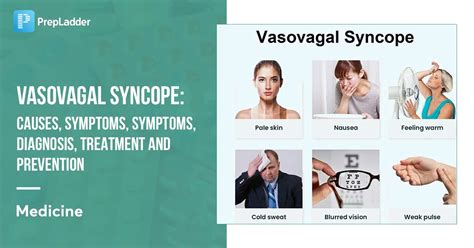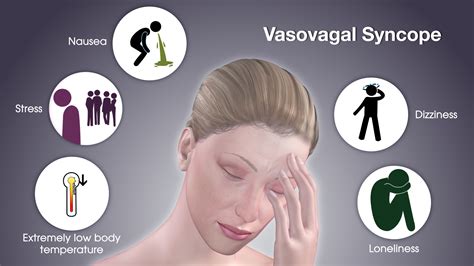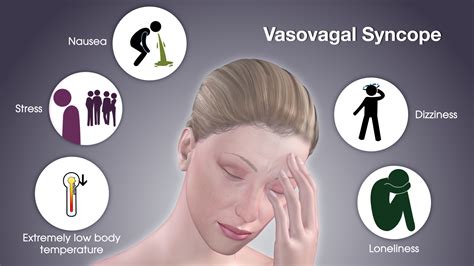Intro
Vasovagal syncope, also known as a common faint, is a type of fainting spell that occurs when the body overreacts to certain triggers, such as stress or pain. This condition is characterized by a sudden drop in heart rate and blood pressure, which can lead to a temporary loss of consciousness. Vasovagal syncope is a relatively common condition that can affect anyone, regardless of age or health status. In fact, it is estimated that up to 50% of people will experience at least one episode of vasovagal syncope in their lifetime.
The exact cause of vasovagal syncope is not fully understood, but it is thought to be related to the body's "fight or flight" response. When the body perceives a threat, it releases stress hormones, such as adrenaline, which prepare the body to either fight or flee. In some cases, the body may overreact to this stress response, leading to a sudden drop in heart rate and blood pressure. This can cause a decrease in blood flow to the brain, leading to a temporary loss of consciousness.
Vasovagal syncope can be triggered by a variety of factors, including stress, pain, fear, and even certain medical procedures. Some people may experience vasovagal syncope in response to specific situations, such as seeing blood or receiving a vaccination. Others may experience it in response to more general stressors, such as public speaking or taking a test. In some cases, vasovagal syncope may be a one-time event, while in others it may be a recurring problem.
What Are the Symptoms of Vasovagal Syncope?

Other symptoms of vasovagal syncope may include:
- Pale or cool skin
- Sweating
- Nausea or vomiting
- Rapid or slow heart rate
- Low blood pressure
- Confusion or disorientation
Types of Vasovagal Syncope
There are several types of vasovagal syncope, including: * Neurocardiogenic syncope: This is the most common type of vasovagal syncope, and it occurs when the nervous system overreacts to stress or other triggers. * Orthostatic syncope: This type of syncope occurs when the body is unable to adjust to changes in position, such as standing up too quickly. * Postural orthostatic tachycardia syndrome (POTS): This is a condition characterized by a rapid heart rate and other symptoms that occur when standing up.How Is Vasovagal Syncope Diagnosed?

Treatment Options for Vasovagal Syncope
Treatment for vasovagal syncope typically focuses on managing the underlying triggers and preventing future episodes. Some treatment options may include: * Lifestyle changes: The doctor may recommend lifestyle changes, such as increasing fluid intake, avoiding triggers, and getting regular exercise. * Medications: In some cases, the doctor may prescribe medications to help manage the symptoms of vasovagal syncope, such as beta blockers or fludrocortisone. * Counseling: The doctor may recommend counseling or therapy to help the person manage stress and anxiety.What Are the Complications of Vasovagal Syncope?

Preventing Vasovagal Syncope
There are several steps that people can take to prevent vasovagal syncope, including: * Staying hydrated: Drinking plenty of fluids can help prevent dehydration, which can contribute to vasovagal syncope. * Avoiding triggers: Identifying and avoiding triggers, such as stress or certain medical procedures, can help prevent vasovagal syncope. * Getting regular exercise: Regular exercise can help improve overall health and reduce the risk of vasovagal syncope. * Managing stress: Stress management techniques, such as meditation or deep breathing, can help reduce the risk of vasovagal syncope.Living with Vasovagal Syncope

Coping with the Emotional and Psychological Aspects of Vasovagal Syncope
Vasovagal syncope can have a significant impact on a person's emotional and psychological well-being. Some tips for coping with the emotional and psychological aspects of vasovagal syncope include: * Seeking counseling: Seeking counseling or therapy can help people cope with the anxiety and stress associated with vasovagal syncope. * Practicing relaxation techniques: Relaxation techniques, such as meditation or deep breathing, can help reduce stress and anxiety. * Connecting with others: Connecting with others, such as friends or family members, can help people feel supported and less isolated.What is vasovagal syncope?
+Vasovagal syncope is a type of fainting spell that occurs when the body overreacts to certain triggers, such as stress or pain.
What are the symptoms of vasovagal syncope?
+The symptoms of vasovagal syncope can vary from person to person, but they often include a feeling of lightheadedness or dizziness, followed by a loss of consciousness.
How is vasovagal syncope diagnosed?
+Diagnosing vasovagal syncope can be challenging, but a doctor may use a variety of tests and procedures, including a medical history, physical exam, electrocardiogram (ECG), blood tests, and tilt table test.
What are the complications of vasovagal syncope?
+While vasovagal syncope is typically not a life-threatening condition, it can have some complications, such as injury, anxiety and stress, and underlying medical conditions.
How can I prevent vasovagal syncope?
+There are several steps that people can take to prevent vasovagal syncope, including staying hydrated, avoiding triggers, getting regular exercise, and managing stress.
We hope this article has provided you with a comprehensive understanding of vasovagal syncope, its symptoms, diagnosis, treatment, and prevention. If you have any further questions or concerns, please don't hesitate to reach out to us. We encourage you to share this article with others who may be experiencing similar symptoms, and to take the necessary steps to manage and prevent vasovagal syncope. By working together, we can reduce the risk of vasovagal syncope and improve overall health and well-being.
